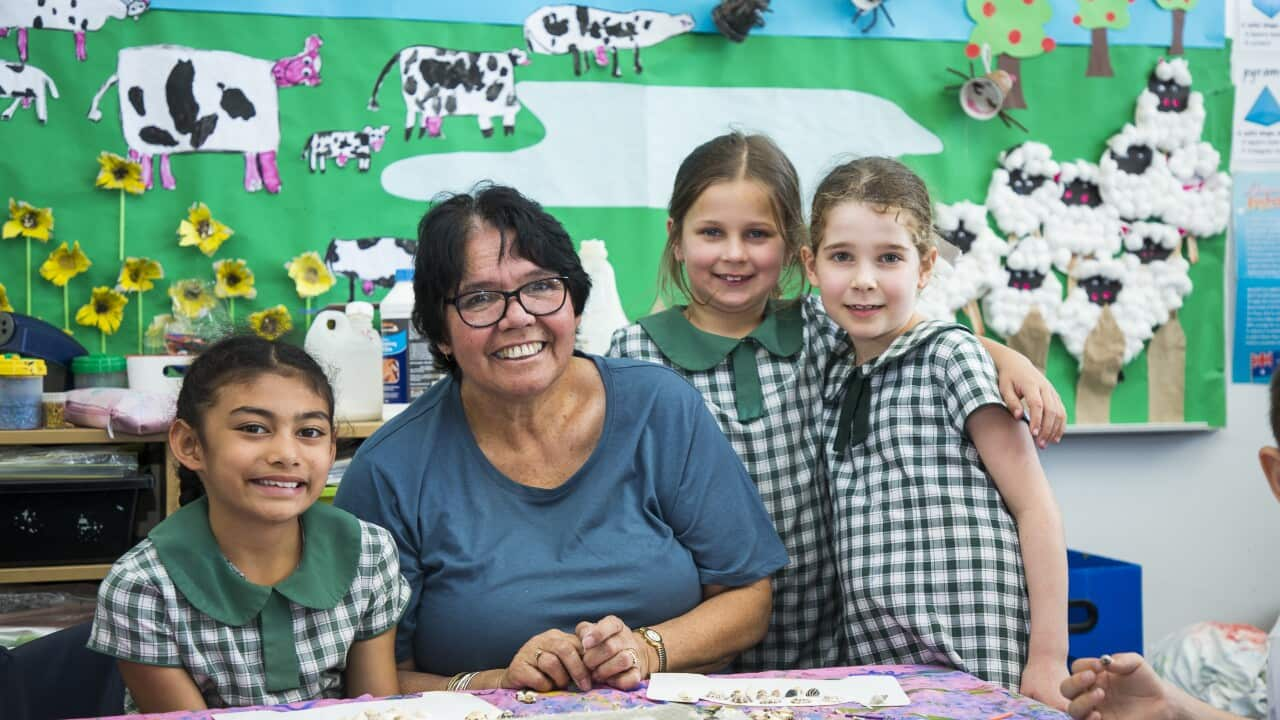A new campaign, named 'Know Your Country', is calling for First Nations cultural educators in every primary school in the country.
The national push aims to embed Indigenous knowledges, culture and perspectives in the classroom by creating roles for a local First Nations community member in both public and private education systems.
The campaign, launched on Thursday, calls on all levels of government to commit funding before the next election.
Mamu woman Phyllis Marsh, is a cultural educator at West Moreton Anglican College in south-east Queensland and said she has witnessed a change in all of her students.
"It's every student's educational right, to learn about the ancient history of this country, to learn about the ancient history of the country they are learning on," she said.
"I'm talking to them about the ancient architectural designers, the ancient engineers, the first peoples who use rocks to construct - it's such a privilege to share this knowledge, to help them grow and learn things that we were never taught in school."
First Nations cultural educators would be locally-approved and would not replace the need for Indigenous knowledges in the curriculum or student support staff.
The aim is to embed a local community member to engage with all young students and perform a co-teaching mentor role.

Aunty Phyllis Marsh (L) believes it's every student's educational right to learn about the ancient history of this country and the land they are living on.
Next step in reconciliation
A poll of more than a thousand people, commissioned by 'Know Your Country', found that seven in ten Australians surveyed agree that educations is the key to "reducing racism."
According to Phyllis Marsh, the initiative could lead to a 'generational transformation'.
"This is different. This is innovative, we want everyone to know their country," she told NITV News.
"This puts the cultural educators in the school to really enhance that education and raised knowledge of all students within this country of either their own culture, or the culture that had existed and is still practiced today."
Wiradjuri man and World Vision First Nations Policy Advisor, Dr Scott Winch, wrote the underpinning policy for the campaign.
He told NITV News that the next step towards reconciliation starts at school.
“A good primary school education featuring regular, positive relationships with people from the local First Nations community will set all Aussie kids up for life-long learning, appreciation and respect for Aboriginal and Torres Strait Islander people and culture,” Dr Winch said.
A First Nations Advisory body has strategic oversight of the campaign, including Kungarakan and Iwaidja man, Professor Tom Calma from the Australian Literacy and Numeracy Foundation, and Amnesty International's Nolan Hunter.
The program hopes to eventually expand to high schools.

The Gujuga Foundation, located in La Perouse, has received funding to support their Dharawal Language & CultureTutors program.
Language boost
More work has been done to strengthen cultural connections on a state level, with 19 community organisations and groups across New South Wales getting a boost to maintain Aboriginal languages.
The Aboriginal Languages Trust announced the recipients of more than $860,000 in funding on Thursday.
The grants program will fund a range of projects across the state, including for the Gujaga Foundation to support their Dharawal Language & Culture Tutors and towards Ngabu Bingayi Aboriginal Corporation's Guuyata Dhanggati Language Kit Development.
Some of the projects funded include teaching resources to use in local schools and early childhood centres.
Aboriginal Languages Trust Board Chairperson, Jason Behrendt, said the momentum to preserve our languages is growing.
“The high number and quality of applications received reflects the dedication and hard work by communities to keep their languages alive and thriving for now and future generations.” he said.


